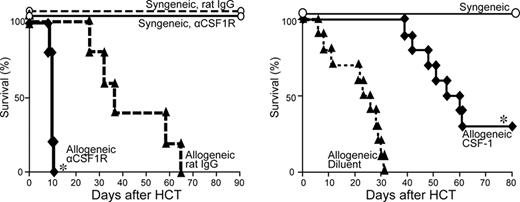Abstract
Abstract 242
We also explored the mechanisms by which host macrophages could potentially control donor T cell expansion induced by host DC after allo-HCT. We found that host macrophages isolated from allogeneic recipients inhibited the proliferation of allo-reactive T cells co-cultured with host C57BL/6 DC partly through a cell-cell contact pathway. Host macrophages were also able to engulf and reduce alloreactive T cells after few hrs of culture. Consistently, 18 hrs after allo-HCT, the number of donor T cells accumulating in the recipient spleen and mesenteric LNs were higher in Ab-treated mice compared to the control groups and CFSE-labeled donor T cells were engulfed by splenic macrophages during the first day of transplant and prior to the initiation of donor T cell proliferation. These results suggest that host macrophages limit the expansion of donor T cells through their ability to engulf donor T cell and to inhibit donor T cell proliferation induced by host DC stimulation.
Further supporting the importance of host macrophages in regulating the development of GVHD, we found that pre-transplant administration of the cytokine CSF-1 increased the number of spleen macrophages, limited the expansion of donor allo-reactive T cells and improved GVHD outcome (Figure right panel). Altogether, we showed that in contrast to host DCs, host macrophages modulate GVHD through their ability to limit donor T cell activation and expansion. In addition, our data also identify pre-transplant CSF-1 injection as a novel clinical strategy for the prevention of GVHD in patient candidate for allo-HCT.
No relevant conflicts of interest to declare.
Author notes
Asterisk with author names denotes non-ASH members.


This feature is available to Subscribers Only
Sign In or Create an Account Close Modal